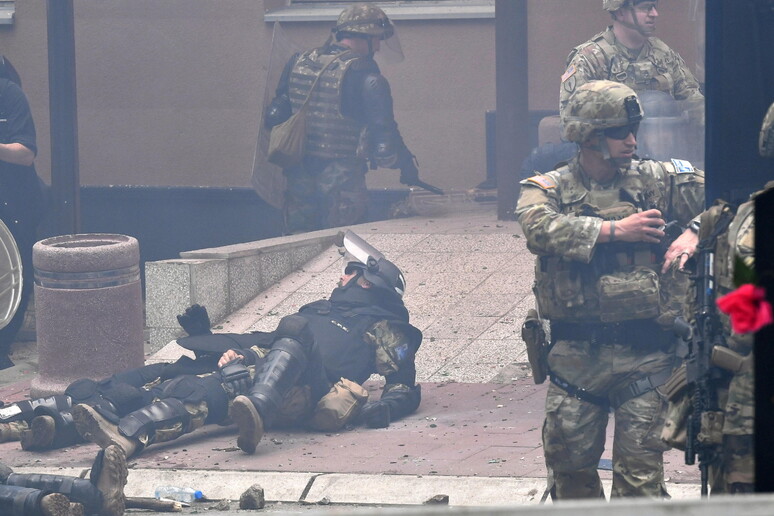Renewed tensions in northern
Kosovo threaten to precipitate the situation in the heart of the
Balkans, with the ethnic clash escalating worryingly today into
violent clashes between NATO Force soldiers and Serb protesters
opposing the entry into office of new ethnic Albanian mayors in
the four largest Serb-majority municipalities in the north. The
new serious incidents, following last Friday's, occurred in
Zvecan, where the Kfor military, after repeated warnings and
calls for the lifting of blockades that also prevented the
movement of local police vehicles, confronted Serb demonstrators
who had been besieging the local town hall for hours to prevent
the new mayor from taking office. In the fierce clashes, the
military made extensive use of blackjacks, tear gas and
deafening bombs, while the Serbs responded with dense throwing
of rocks, bottles, Molotov cocktails and other objects. The toll
of the battle was very heavy, with dozens of NATO soldiers
wounded, 11 of them Italians from the Ninth Alpine Regiment
L'Aquila. At first there was talk of 41 soldiers involved, but
in the evening the Kfor command reported about 25 soldiers
wounded. Three of our compatriots suffered fairly serious
injuries-mostly burns from throwing molotov cocktails and
fractures-but their lives are not in danger. The commander of
the Kfor mission, Italian General Angelo Michele Ristuccia,
expressing solidarity with the wounded soldiers, let it be known
that he is personally following the evolution of the situation
and assured that the NATO contingent remains "impartial."
Immediate solidarity and participation came from Prime Minister
Giorgia Meloni - who condemned the attack as "unacceptable and
irresponsible," warning that no other such actions will be
tolerated - and from Foreign and Defense Ministers Antonio
Tajani and Guido Crosetto, who expressed the institutions'
closeness to the wounded soldiers and their wishes for a speedy
recovery. "It is crucial," Meloni stressed, "that further
unilateral actions by the Kosovo Authorities are avoided and
that all parties involved immediately take a step back by
contributing to the easing of tensions. The Italian government's
commitment to peace and stability in the Western Balkans is
maximum and we will continue to work with our allies." Several
dozen Serbs were injured in clashes in Zvecan, one of four
Serb-majority northern municipalities.
The others are Zubin Potok, Leposavic, and Mitrovica North.
In these other localities, too, the Serb population is
contesting the election of the new ethnic Albanian mayors in the
April 23 local vote, a poll boycotted by the Serbs and whose
legitimacy is also contested by Belgrade because of the
extremely low turnout of just over 3 percent. It is
unacceptable, Serbs argue, for mayors representing 2 percent of
the population to govern cities whose inhabitants are 98 percent
ethnic Serbs. The clashes came at the end of a hectic day filled
with meetings, contacts and phone calls in an attempt to defuse
what appears to be a bomb ready to explode at any moment with
unpredictable consequences. The leadership in Pristina-President
Vjosa Osmani and Prime Minister Albin Kurti-while stressing the
regularity of the April 23 vote, point the finger at Belgrade
and the illegal structures it maintains in northern Kosovo.
Structures, they argue, that have allegedly turned into criminal
gangs attacking Kosovo police, KFOR soldiers and journalists,
and to which they place the entire responsibility for the
violence and persistent instability in the north. Serbian
authorities for their part accuse Pristina of wanting to occupy
the north with the aim of expelling the local Serbian
population. A wall-to-wall situation that seems to have no way
out. And proving this are the unsuccessful outcomes of the
numerous meetings over the past few days and hours that Belgrade
and Pristina have had with representatives of the international
community -- EU, US, Quint, NATO, OSCE --, all peppered with
calls for calm and to avoid further escalation. U.S. Ambassador
to Pristina Jeff Hovernier proposed that the new mayors work not
from their offices in their respective town halls but in other
buildings. However, a solution branded as "unacceptable" by
Kosovo Deputy Prime Minister Besnik Bislimi.
ALL RIGHTS RESERVED © Copyright ANSA





